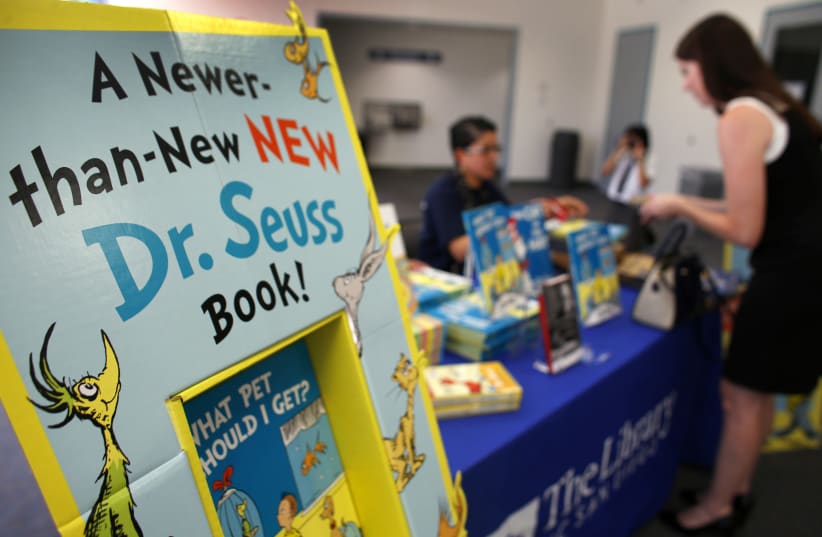Several books penned by Dr. Seuss jumped onto Amazon’s best-sellers ranking after the company that oversees the estate of the iconic children’s book author said it decided to discontinue publication of six titles that “portray people in ways that are hurtful and wrong.”
As of Tuesday afternoon, 13 of the top 20 best-selling books listed on Amazon in the US were by Dr. Seuss.
Among those were four of the books that Dr. Seuss Enterprises said it will stop publishing and licensing: If I Ran the Zoo (No. 9), And to Think That I Saw It on Mulberry Street (No. 15), On Beyond Zebra! (No. 19) and Scrambled Eggs Super! (No. 20). The surge in sales reflected a desire by fans to get copies of the now-blacklisted books before they’re unavailable.
Amid the widespread attention to Dr. Seuss and discussion of “cancel culture,” other books by the late Theodor Seuss Geisel, most of which are not in danger of being pulled from publication, also saw big jumps in demand.
No. 1 on Amazon’s US best-sellers list was Dr. Seuss’s Beginner Book Collection, a compilation of five classic Seuss books; No. 3 was Oh, the Places You’ll Go!; No. 4 was The Cat in the Hat; and Green Eggs and Ham stood at No. 5.
Also on the chart were Your Favorite Seuss, with 13 favorite Dr. Seuss stories (No. 8); Dr. Seuss’s Second Beginner Book Collection (No. 13); One Fish Two Fish Red Fish Blue Fish (No. 14); What Pet Should I Get? (No. 16); and Fox in Socks (No. 17).
The offensive depictions in the Dr. Seuss six books in question include two monkey-like characters from “the African island of Yerka” in If I Ran the Zoo, and a Chinese character in And to Think That I Saw It on Mulberry Street who is drawn with stereotypically racist characteristics, including a pointed hat and lines for eyes.
Dr. Seuss Enterprises announced they were pulling the books because they “portray people in ways that are hurtful and wrong.”
The announcement fell on Geisel’s birthday, which is also Read Across America Day. He was born on March 2, 1904, and passed away on September 24, 1991.
The criticism leveled against the books is that both illustrations and text reveal cultural points of view that are no longer accepted.
For example, in If I Ran the Zoo, three Asian characters are carrying a white male on their heads and the text describes their homelands as “countries no one can spell.”
Geisel was described by children’s literature Prof. Philip Nel as “America’s first anti-Fascist children’s writer,” The Atlantic reported in 2017. Yet, it seems he had a habit of depicting Japanese characters in biased ways, which were commonplace during the Second World War and, while a student in college, would depict Jewish characters in ways which would not be accepted today.
CNN anchorman Jake Tapper tweeted an image from a work by Seuss in which characters with and without stars seem to agree that having a star or not is not important for friendship.
Followers of the CNN reporter complained against the effort to allegedly “cancel Seuss.”
It should be noted that the works described here were political and adult-oriented cartoons and were not meant for children as the image shared by Tapper.
OF GERMAN-AMERICAN heritage himself, Seuss was radically opposed to Hitler and Mussolini, and supported the US entering the war against Nazi Germany, Imperial Japan and Fascist Italy in his political cartoons.
In a 1942 political cartoon, he depicted Japanese-Americans as an alleged “fifth column,” which could hurt American society.
He was not against changing his books and indeed went back to one of the books on the list, And to Think That I Saw It on Mulberry Street in the 1980s to remove a reference about “yellow-faced Chinaman who eats with sticks.”
In many of his works for children, Seuss poked fun at racism and chauvinism and suggested most human battles are foolish and should be avoided. This can be seen in his The Butter Battle Book, where a war is waged over the proper way to butter toast, or in Horton Hears a Who!, a book which might be understood as standing in support of scientific curiosity and protecting people from other cultures.
Usually, sitting American presidents mention Seuss in their Read Across America Day message to the nation.
This year the holiday is focused on diversity, and US President Joe Biden did not mention Seuss, ABC reported.
